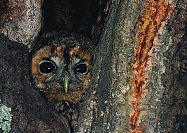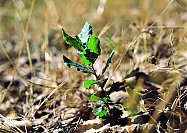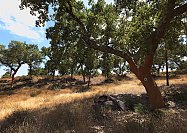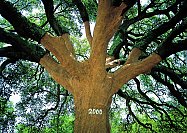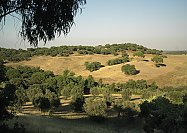For a good browsing experience we recommend using the latest version of Chrome, Firefox, Safari, Opera or Internet Explorer.
CORK
THE FOREST. LIFE HOTSPOT
The montados (cork oak forests) are determinant environmental, social and economic pillars in the Mediterranean countries and support a unique and fragile ecology which is a habitat for rare or endangered species. They are the basis for one of the 35 most important biodiversity conservation global ecosystems - equivalent to havens such as the Amazon, Borneo or the African savannah. Over two hundred animal species and 135 plant species find in the montado the ideal conditions for survival.
Emblematic of the warm climate and arid land, the montados protect against erosion and consequent desertification. They are an anti-fire barrier, due to the weak combustion of cork, and play a significant role in regulating the hydrological cycle. They also provide a significant contribution with regard to the air we breathe because they fix carbon dioxide, which without them would be released into the atmosphere. It is estimated that every year the cork forests retain up to 14 million tons of CO2, a precious help to reduce greenhouse gas emissions, the main cause of climate change. Equally surprising is the fact that the cork trees increase the retention capacity of these gases during the natural regeneration process that happens after cork harvest - a harvested cork oak tress retains, on average, five times more CO2. The ability to retain carbon dioxide also extends to cork manufactured products, which continue to fulfill this function of CO2 fixation.
"Who cares about their grandchildren, plants a cork oak tree."
Popular saying
These forests are one of the best examples of the balance between environmental conservation and sustainable development - only the fact that no tree be cut down during the process of extracting the cork is a unique case in terms of sustainability. And they are the basis for a future economy. Around the culture of cork spins the highest paid agricultural work in the world, plus a number of other agricultural, forestry, silvopastoral, hunting and economic activities - the cork industry is the engine of this sustainable development, helping to keep thousands of jobs and work to fix people to their land.
According to the WWF - World Wild Fund for Nature, over a hundred thousand people in southern Europe and northern Africa depend directly and indirectly in these forests. Only in Portugal, where there is the largest area of ??the world montado, directly depends on cork economy about 700 companies; about ten thousand factory work jobs; 6500 jobs in forest extraction and thousands of indirect jobs (catering, tourism, etc..). Transformed Cork (about 70% in cork stoppers) is intended mainly for export (90%), representing 2.2% of total Portuguese exports. The cork oak tree plays such an important role that has been enshrined in late 2011, by unanimous vote of Parliament, the National Tree of Portugal and is protected by law since the thirteenth century.
